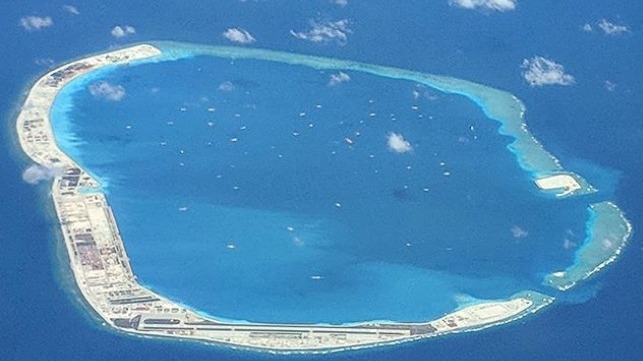U.S. Restricts Exports to 24 Firms Over S. China Sea Island-Building

The United States has imposed export restrictions on 24 major Chinese companies for their role in the construction of China's island bases in the South China Sea.
The firms include some of the biggest names in China's maritime sector, including China Communications Construction Company's dredging division and a telecommunications research lab belonging to China Shipbuilding Industry Corporation (CSIC), now part of Chinese state shipbuilding giant CSSC. The vast majority of business divisions within CCCC and CSSC are not covered.
"Beijing has pursued environmentally destructive land reclamation and militarization of disputed outposts. This has done irreparable damage to coral reefs. They have also used these platforms in the South China Sea as platforms of coercion against their neighbors," said a senior state department official in a press call. "In the case of Mischief Reef and the Spratly Islands . . . within the Philippines’ exclusive economic zone and on its continental shelf, Beijing’s development there – its building and militarization – is a violation of the Philippines’ sovereign rights."
Government-owned Chinese companies were instrumental in the construction of these artificial islands, which Beijing initially described as outposts for peaceful, non-military purposes. The new U.S. export restrictions - and related visa restrictions for dozens of executives of these firms - are intended to convey that the United States does not approve of Chinese expansionism in the South China Sea.
The state department official also highlighted some of CCCC's controversial contracting practices in Kenya, Bangladesh, Sri Lanka, Malaysia and the Philippines, where its subsidiaries have been accused of setting up unfavorable deals with the host governments.
The decision means that the 24 company divisions on the list will have to seek Commerce's approval if they want to obtain items covered by the restrictions. "As a practical matter, the licensing policy is presumption of denial for any such proposed exports, re-exports, or in-country transfers," a Commerce official said. The listing is unlikely to have a major impact beyond its symbolic and reputational effects, as the 24 affected entities imported a total of just $5 million in goods from the U.S. over the past five years.
Military tensions continue
On the same morning, Chinese forces launched two "carrier-killer" ballistic missiles into the South China Sea, according to the South China Morning Post. The first, an intermediate-range DF-26B, originated in central China about 1,200 miles from the coast; the second, a medium-range DF-21D, lifted off in coastal Zhejiang province. These two missile classes are purpose-built for countering American aircraft carriers at distances far outside of fighter range.

that matters most
Get the latest maritime news delivered to your inbox daily.
The launches are believed to be in response to an American U-2 spy plane flyover during a Chinese naval drill in the Bohai Sea, the gulf just east of Beijing and Tianjin in northern China. The incident occurred Tuesday in a Chinese-declared no-fly zone, and it prompted a formal diplomatic protest from Beijing.
“[The fly-over] seriously interfered in normal exercise activities. It seriously violated the code of safe behaviour for air and sea between China and the US and international norms. It easily leads to misjudgment, or could even cause accidents in the sea and air,” said Chinese ministry of defense spokesperson Wu Qian, speaking to the SCMP. "China firmly opposes such provocative actions and has lodged solemn representations with the US side.”
